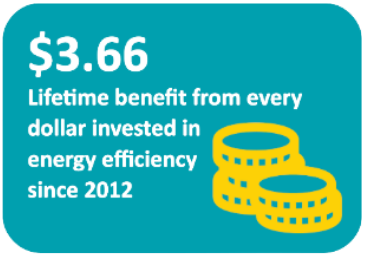

By Yiran He | Tue, September 23, 25
New Hampshire residents and businesses face some of the highest energy costs in the nation. Many customers, including rural, remote, and low- to moderate-income customers, face uniquely high costs and persistent market barriers to energy efficiency upgrades that would help lower costs. The need in the state for additional and expanded ways of addressing energy affordability is significant, and so is the potential. Since 2012, every dollar invested in efficiency has resulted in $3.66 in lifetime benefits. Increased adoption of energy-efficient equipment and building envelope upgrades could reduce energy use by nearly 10 percent, with the potential to reduce average annual energy bills for low-to-moderate income households by 40 percent.
New Hampshire can build on its long track record of energy efficiency programs and policies. Current policies and efforts include the NHSaves energy efficiency programs, energy benchmarking for public buildings, and building energy codes through the 2018 IECC. (See our Regional Roundup for more details on the energy efficiency landscape in New Hampshire.) This blog post highlights takeaways from NEEP’s new report, Energy Efficiency in New Hampshire: A Strategy to Lower Energy Bills & Improve Energy Resilience.
Recognizing the Benefits of Energy Efficiency in New Hampshire
Energy efficiency is a critical strategy to help residents and businesses lower their energy bills while supporting energy resilience and the local economy. The state’s investor-owned electric and gas utilities and the New Hampshire Electric Cooperative have collaborated since 2001 to offer statewide energy efficiency programs under the NHSaves program.
However, in recent years, New Hampshire’s energy efficiency programs have been at risk. In 2021, NHSaves was almost eliminated when the Public Utilities Commission (PUC) rejected their proposed plan. After some debate, with the passage of HB549 (“An Act Relative to the System Benefits Charge and the Energy Efficiency and Sustainable Energy Board”) in 2022, New Hampshire retained its energy efficiency programs, but funding was limited by a spending cap, resulting in lower savings achieved and lowering the potential economic benefits of programs. The energy efficiency programs are still being offered today: the utilities are currently implementing the 2024-2026 Plan.
New Hampshire has shown that it values energy efficiency as a resource. Earlier this year, the legislature successfully advanced energy efficiency alongside affordability through the recent passage of SB4 (“An Act Relative to Commercial Property Assessed Clean Energy and Resiliency (C-PACER)”).
Opportunities Ahead for Energy Efficiency to Lower Costs
Against this backdrop, we see additional opportunities coming down the road.
First, the NH utilities are gearing up to kick off the next three-year cycle of NHSaves, the 2027-2029 Statewide Energy Efficiency Plan. This presents an opportunity for supporting and enhancing the existing programs. As part of utility planning, the state might explore options for cross-promoting weatherization and efficient heat pump measures, as well as maintaining the state’s cost-benefit test (called the Granite State Test).
Second, the state is expecting $70 million for Home Energy Rebates through federal Inflation Reduction Act funds. (See our recent blog post for updates on these rebates across the NEEP region.) These funds could be used for increased weatherization or to provide customer incentives for high-efficiency heat pumps. The rollout of these rebates also presents an opportunity for the state to establish a public-facing contractor network to support qualified contractors.
The next legislative cycle may create additional opportunities for policies like building codes that require legislation. While most New Hampshire building codes, such as fire and electric codes, are on the 2020 or 2021 standards, the state’s building energy code is at the 2018 level. Last cycle, HB96 (“An Act Requiring New Hampshire Builders to Use the 2021 Energy Building Codes or a Similar Code that Achieves Equivalent or Greater Energy Savings”) was introduced to update building energy codes to the 2021 standard, but it didn’t make it past the House. The next legislative cycle presents an opportunity to align the state’s building energy code with the updated and cost-effective model code.
A Playbook for Energy Efficiency
To show how New Hampshire can invest in energy efficiency, NEEP is pleased to share our new report, Energy Efficiency in New Hampshire: A Strategy to Lower Energy Bills & Improve Energy Resilience. This report recommends ways that energy efficiency can advance affordability and reliability for all customers, based on feedback from a diverse group of government, industry, and nonprofit stakeholders. Now is the time to invest and prioritize energy efficiency in New Hampshire, to help save on customer energy bills, build a robust workforce, and support a more resilient and sustainable energy future.



